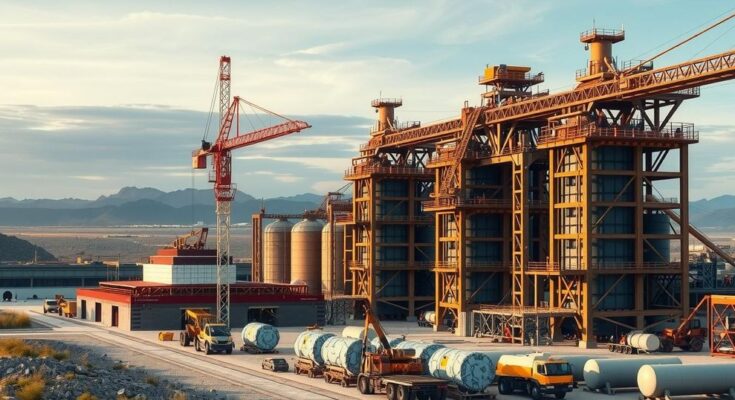A new Chinese-funded steel plant in Bolivia aims to satisfy half of the country’s steel demand, create jobs, reduce reliance on imports, and bolster economic recovery. With a production capacity of 200,000 metric tons annually, this initiative also signifies enhanced trade relations with China. The project emerges after a long period of delays and signals a renewed focus on industrial growth and international trade partnerships for Bolivia.
A new steel plant in Puerto Suarez, Bolivia, financed by the Export-Import Bank of China, is projected to fulfill half of Bolivia’s steel demand and significantly aid in its economic revival and industrial modernization. This $546 million Mutun plant, inaugurated on February 24, is set to be operated by Sinosteel Engineering and Technology, a subsidiary of the Chinese state-owned Sinosteel Corporation, during its initial operational year.
The project is anticipated to generate approximately 1,000 jobs for Bolivians, offering optimism amid the nation’s struggles with dwindling foreign currency reserves, fuel shortages, soaring inflation, and declining natural gas reserves. According to Omar Portillo, a professor at the Higher University of San Andres, this initiative will curtail foreign expenditures on steel imports and enhance Bolivia’s export capabilities in the steel sector.
The Mutun plant aims to produce 200,000 metric tons of steel annually, largely providing rebar and wire mesh valued at $260 million. It will utilize 66,000 tons of raw materials each month sourced from the Cerro Mutun deposit, known to be among the largest iron ore deposits globally, estimated at 40 billion tons. This notable project faced lengthy delays spanning five decades due to the cancellation of an initial contract with Jindal Steel Bolivia in 2012.
The establishment and subsequent completion of the plant have been credited to Chinese investment under President Luis Arce’s administration, revitalizing the project after the protracted Jindal Steel dispute, which Portillo indicated set back Bolivia’s iron industry by nearly a decade. The Bolivian government is now exploring plans for a second steel plant, potentially involving additional Chinese collaboration, with the current facility expected to enhance Bolivia’s iron and steel exports significantly.
China has emerged as Bolivia’s primary trading partner in both mining and industrial sectors, with Bolivian exports to China reaching $1.21 billion in 2023, predominantly consisting of precious metals, zinc, and lead ores. Economists like Juan Jose Bedregal foresee a growing role for China in Bolivian trade, particularly through increased access for Bolivian food products to the Chinese market and Chinese involvement in developing Bolivia’s lithium industry.
Moreover, China’s investments extend into Bolivia’s construction sector, with various Chinese firms securing contracts for road development. Portillo noted that Bolivia’s economy would benefit from the steel plant as well as the China-supported Chancay Port in Peru, underscoring the necessity for Bolivia to diversify its fuel supply sources and streamline import logistics, which are currently quite costly.
Portillo recommended the establishment of an “integration route” with Chancay Port to enhance trade, emphasizing that strengthening the relationship with the Chinese government could facilitate this objective. This strategic move could significantly bolster Bolivia’s export potential.
In summary, the China-funded steel plant in Bolivia represents a significant advancement in the nation’s industrial capabilities and economic recovery, fostering job creation and reducing reliance on foreign steel imports. The strategic partnerships established through this project and other Chinese investments position Bolivia for enhanced trade, particularly within the context of the growing BRICS influence. Overall, this development signals a promising future for Bolivia’s economic landscape and its global trade dynamics.
Original Source: www.chinadaily.com.cn




